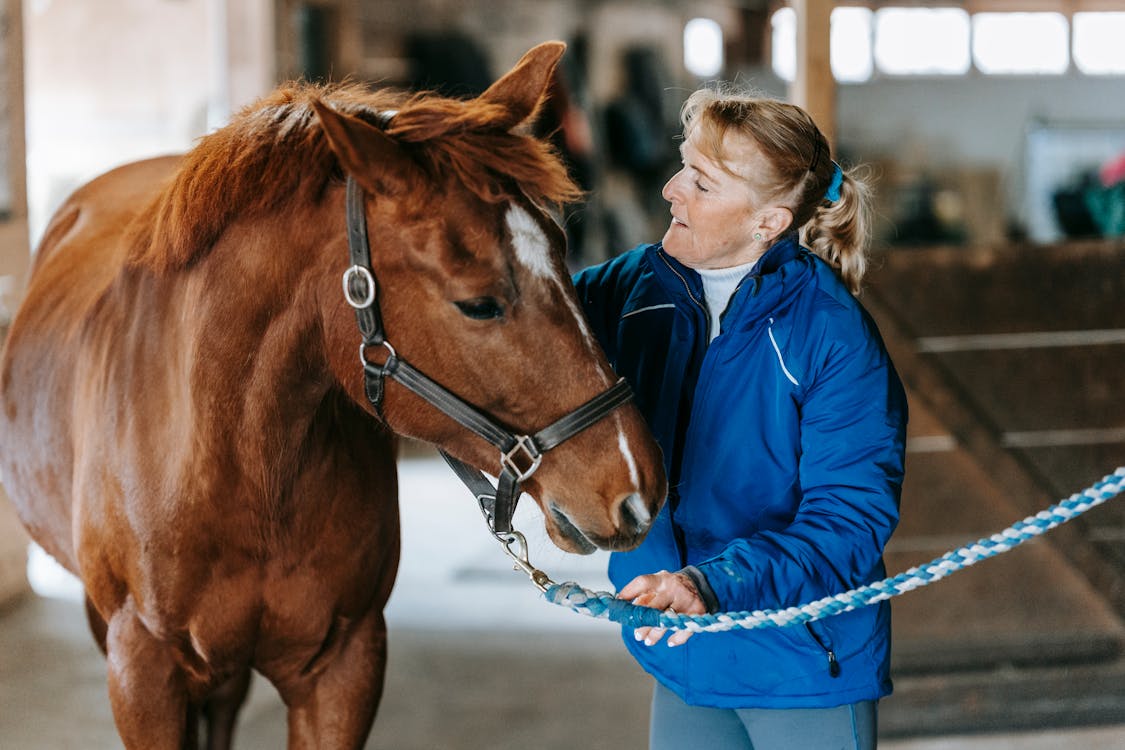Health & Education
We all want the best care possible for our horses. The Heath & Education section covers both Learning Institutions, Organizations as well as many sources for equine assistance including Veterinarians and Farriers.
For those who want a to formally study horses, the Education section includes College Riding, Equine Studies, and Veterinary Schools. Learn about the wide variety of horses in the Horse Breeds section. Supplements and Treatments Therapy are also included in the section.
Everyone can learn from Fine Art and there are some specialty Museums that might surprise you.
Horses as a therapy partner enrich the lives of the disabled. These facilities are listed in our Therapeutic Riding section. To help children and young adults build confidence and grow emotionally, please see the resources available on the Youth Outreach page.
Looking for a place to keep your horse? You can find it in the Horse Boarding section. Traveling? Find a Shipping company or Horse Sitting service if your horse is staying home!
Want to stay up to date with the latest training clinics or professional conferences? Take a look at our Calendar of Events for Health & Education for the dates and locations of upcoming events.
Do we need to add more? Please use the useful feedback link and let us know!

There’s more to a green pasture than meets the eye, especially when horses are involved. Healthy grazing land isn’t just a scenic backdrop, it plays a vital role in a horse’s overall well-being, influencing everything from digestion to behavior. Yet despite its importance, pasture management is often handled with a shrug and a hopeful eye on the weather. Many rely on routine or guesswork, rotating fields out of habit rather than understanding. The outcome is familiar and frustrating: worn-out grass, compacted soil, and land that struggles to recover season after season.
That passive approach is starting to shift. With live satellite images and analytics, landowners can finally see their pastures with clarity and precision. These tools reveal patterns and problems that would otherwise go unnoticed, making it easier to balance grazing pressure, protect soil health, and plan ahead.
Hidden Struggles Behind Healthy Grazing
Pasture management may look straightforward in theory: move the horses, let the grass recover, repeat. But anyone working the land knows it rarely plays out that smoothly. Grass grows unevenly. Weather patterns shift without warning. Some areas flourish while others turn to bare soil under constant trampling. And when every acre needs to support both animal health and long-term land use, the pressure to get it right can be relentless.
One of the toughest challenges is preventing overuse. When horses graze too long in one spot, the grass loses its ability to rebound. What starts as a patchy field can quickly become a worn-out stretch of dirt, opening the door to soil erosion and invasive plants. Then come the seasons. Spring might offer a burst of growth, giving a false sense of abundance, but summer heat or autumn rains can flip the script overnight. Without consistent visibility into what’s happening across the pasture, many decisions come too late. By the time the damage is clear, recovery takes time, effort, and in many cases, money that could have been saved.
Tools Transforming Pasture Management
Fortunately, land management is no longer limited to pacing the fields and relying solely on experience. A new generation of tools is transforming how ranchers and horse owners care for both their pastures and their animals. These innovations are not just convenient additions to old routines. They are changing the way we understand the land, helping people make decisions that are rooted in evidence instead of habit.
Drones are becoming a common sight on modern ranches, flying overhead to capture high-resolution images that reveal grazing patterns, soil wear, and even water buildup in low-lying areas. Instead of waiting for visible damage to appear, ranchers can now detect early signs of stress and act before problems take hold. Soil sensors provide another layer of insight, quietly monitoring moisture levels, pH balance, and nutrient availability around the clock. Combined with small-scale weather stations that track hyperlocal changes in temperature, wind, and precipitation, these tools help build a clearer picture of what is really happening at ground level.
Perhaps the most revolutionary shift comes from above. With the ability to view live satellite images, landowners can now see large-scale patterns across their property that would be impossible to spot on foot. These satellite visuals show how vegetation is growing, where it's thinning, and how those trends change over days, weeks, and seasons. This kind of perspective brings a level of clarity that has never been available before. It turns guesswork into strategy, helping to protect the land from overuse while ensuring horses have access to consistent, high-quality forage.

How Satellites Guide Smarter Grazing Decisions
Satellite data is not just about seeing your pasture from above but about understanding it on a deeper level. When used for pasture mapping, this technology helps define the true boundaries and conditions of each grazing zone, identifying which areas are thriving and which ones are under stress. It takes the guesswork out of land management by turning distant pixels into clear indicators of ground-level reality.
With EOSDA LandViewer, these insights become both accessible and actionable. The platform allows users to track vegetation health across seasons, compare year-over-year changes, and flag trouble spots before they turn into larger issues. By analyzing plant vitality through vegetation indices like NDVI, LandViewer helps pinpoint where forage is strongest and where recovery is needed. This makes it easier to rotate animals strategically, reduce pressure on vulnerable areas, and make the most of every acre.
The ability to see live satellite images adds a real-time dimension to this process. Instead of waiting for signs of overuse to appear on the ground, managers can act early, adjusting grazing schedules or supplementing feed when needed. And because live satellite imagery captures the big picture, it reveals connections that might be missed in day-to-day observation: like how a dry patch in one field could be tied to drainage issues or how pasture health improves after a rest period. With these tools, grazing decisions become smarter, timing becomes sharper, and the land gets the care it needs to stay productive long term.
Greener Fields Through Smarter Strategies
By bringing together satellite technology, soil sensors, drones, and smart data platforms, pasture management becomes more precise and less reactive. These tools offer a clearer view of land conditions, helping to prevent overgrazing, support faster regrowth, and make better use of every acre. With accurate insights at their fingertips, ranchers can provide more consistent nutrition for their horses, protect soil health, and adapt to seasonal shifts before they become problems. In the end, this tech-driven approach leads to healthier animals, stronger pastures, and a more sustainable relationship between land and livestock.
You can find more interesting stories in our section on Health & Education.

Caring for horses takes more than physical strength or knowledge of basic routines. It requires emotional energy, mental clarity, and the motivation to keep showing up every day. What happens when your body feels tired but your responsibilities never slow down?
Many riders and horse owners ignore their limits until exhaustion starts affecting everything. Mood changes, lack of sleep, and even medications can shift how you feel around the barn. Is it possible to stay motivated when your energy dips and life feels unpredictable?
The pressure to keep pushing often leads to burnout without warning. This article will explore simple ways to support both your motivation and your well-being.
Establish a Daily Routine That Works for You
Creating a routine that fits your energy level can ease daily stress. Not every rider feels sharp early in the morning or late evening. Pay attention to when your mind and body feel most alert.
Spruce notes that a solid daily routine uses peak hours for important tasks and low-energy times for simple ones. However, life can throw unexpected events your way, so it’s crucial to plan for them.
Scheduling flexible free time into your routine lets you shift tasks around without disrupting your flow. This flexibility ensures you never feel rushed, even with unplanned events like doctor’s appointments or social invites.
Schedule stable tasks during those times to get the most done efficiently. Horses thrive with structure, and so do their caretakers in the long run. Organize tasks into natural clusters to avoid constant mental switching throughout the day.
A loose but predictable plan can support both motivation and physical comfort. Leave room for unexpected shifts so you don’t feel boxed in or guilty. This flexible rhythm will help you sustain energy without constant burnout.
How does sleep quality influence daily productivity?
Restful sleep sharpens cognitive function and helps prevent injuries during physical barn tasks. When sleep is poor, motivation dips, and reactions become slower, increasing mistakes with horses. Prioritizing sleep means you’ll be more alert, consistent, and capable when managing both animals and routines.
Emotional fatigue often hides behind habits until it begins to affect everything. You might notice less excitement or increasing dread around normal barn tasks. Low mood or irritation is sometimes mistaken for laziness or disinterest.
Medical News Today states that emotional exhaustion often builds up gradually, leaving people feeling drained and overwhelmed. Over time, these feelings can negatively impact daily routines and relationships. Many people don't recognize the early signs of burnout, which can lead to long-term fatigue.
Pay attention to moments when you're just going through the motions alone. Emotional exhaustion drains motivation and can sneak in without much warning or notice. Make time to reflect on your mindset and track any concerning shifts.
Ask if you still feel connected to your horse or environment. Small changes in your enthusiasm often reflect deeper mental and emotional fatigue. Early recognition makes recovery and change easier before burnout fully develops.
How does decision-making ability relate to emotional fatigue?
Emotional exhaustion can cloud judgment and make once-easy decisions feel overwhelming and frustrating. This mental fog often signals that your emotional bandwidth is shrinking under pressure. Noticing decision fatigue helps you pause and reflect before the stress spirals into burnout.
Supporting Your Body Through Medication Side Effects
Verywell Mind mentions that medication side effects can sneak into your daily routine in frustrating ways. You might feel sudden shifts in mood, energy, or physical comfort without warning. These changes can interfere with your focus, especially during barn chores and riding.
It’s not always easy to link how you feel to what you’re taking. Still, your body might be working harder to adjust than you realize. Tracking symptoms across a few days can reveal useful patterns you didn’t expect. Make room in your routine for extra rest or gentler tasks on hard days.
TorHoerman Law emphasizes that hormonal medications like Depo-Provera may cause fatigue and mood changes. This birth control shot, given every three months, has been linked to serious side effects, including brain tumors. As awareness grows about the dangers of Depo-Provera, some users have taken legal action to address these risks.
The Depo-Provera lawsuit argues that manufacturers failed to properly warn consumers about the complications associated with the drug.
If you suspect your medication is causing negative effects, talk to your healthcare provider as soon as possible. Taking time to rest and adjust your routine supports your focus, energy, and connection with your horse.
How does stress management affect medication efficacy?
Chronic stress changes how your body processes medications and can reduce their intended effects. Stress hormones may interfere with absorption or amplify unwanted side effects over time. Managing stress improves both medication response and your ability to function consistently.
Don’t Underestimate the Power of Micro-Breaks
Short breaks between tasks help your mind and body reset without guilt. Take a few minutes to pause after grooming or feeding your horse. Step outside the barn and give yourself space to breathe and reset.
Healthline highlights that microbreaks, taken every 20 to 30 minutes, often last no longer than five minutes. Research shows these quick pauses can reduce muscle tension and improve mental clarity throughout the day. Studies suggest they may also lower stress and prevent burnout during repetitive or focused tasks.
Enjoy a quiet moment with your horse without any expectations or distractions. Listen to calming music or drink something warm before your next task. These pauses help lower stress and keep energy from crashing too quickly.
Micro-breaks are small but powerful tools that create more sustainable routines overall. They also allow time to appreciate the little joys of being around horses. Breaks are not laziness, they’re investments in long-term mental and physical wellness.
How do micro-breaks affect physical health during labor-intensive tasks?
Taking breaks helps reduce repetitive strain and supports circulation during long periods of physical activity. Micro-breaks prevent overuse injuries and help you return to tasks feeling physically restored. These pauses are essential for maintaining stamina and long-term physical capability.
Caring for horses takes more than strength, it requires tuning into your full well-being. Your physical, emotional, and mental health all play a role in staying motivated long-term. A daily routine that fits your lifestyle can reduce stress and build consistency. Watch for subtle signs of burnout before they grow into overwhelming fatigue.
Medications and stress can sneakily affect your mood and energy, so stay proactive. Even short breaks during your day can reset your mind and body. Self-awareness helps you adjust before things spiral out of balance. These small strategies aren’t luxuries, they’re key to living well with your horses.
You can find more interesting stories in our section on Health & Education.
- Five Tips for Hiring a Horse Shipper
- Tall Fescue Toxicity in Mares
- Healthy Joints for Years of Happy Trails
- $20,000 in student scholarships offered by Purina Animal Nutrition
- Saddle Fit Differences Between Men and Women
- Use of Standardized Exercise Tests in Equine Research
- Helping all horses live healthier lives
- 5 Tips For Keeping Aged Horses Fit To Compete
- Fruits are Fabulous, even for Insulin Resistant Horses!
- 12 Tips for Being a Good Member of Your Boarding Barn
- $10,000 Equestrian Merit Scholarship
- Non-GMO is NOT Necessarily Safe
- Consider Beet Pulp Instead of Oats
- Five Tips About Dummy Foals
- The Role of Nutrition in Managing Muscle Disorders
- Secrets of Successful Riding Instructors
- Horse Veterinarians in Alabama
- Horse Veterinarians in Alaska
- Horse Veterinarians in Arizona
- Horse Vet in Arkansas

































